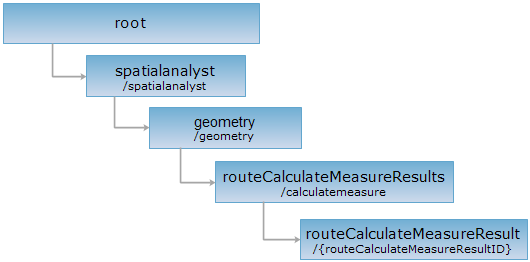
<routeCalculateMeasureResults_uri>/{routeCalculateMeasureResultID}[.<format>]
Calculates M value for the specified point based route object.
Supported Methods:
Supported output formats: rjson, json, html, xml.

Implement the HTTP request on the following URI, where supermapiserver is the server name, with rjson being the output format.
http://supermapiserver:8090/iserver/services/spatialanalyst-sample//restjsr/spatialanalyst/geometry/calculatemeasure/ejqx9g7j_a3cf1644f4fe47669272e1c3b104fd5d.rjson
Returns the descriptive information of the routeCalculateMeasureResult resource.
The response parameters are as follows after implementing the GET request on the routeCalculateMeasureResult resource.
| Name | Type | Description |
| measure | double | The M value of the locater point. |
| message | String | Related information generated while calculating the M value for specified point. |
| succeed | boolean | Whether the analysis result have been created successfully. Returns true if successful; otherwise false. |
The returned rjson format result after implementing the GET request on the routeCalculateMeasureResult resource http://localhost:8090/iserver/services/spatialanalyst-sample//restjsr/spatialanalyst/geometry/calculatemeasure/ejqx9g7j_a3cf1644f4fe47669272e1c3b104fd5d.rjson is as follows:
{
"measure": 532.1658053450750,
"message": null,
"succeed": true
}
Asks for the response identical to the one that would correspond to a GET request, but without the response body. This is useful for retrieving meta-information written in response headers, without having to transport the entire content. The meta-information includes the media-type, content-encoding, transfer-encoding, content-length, etc.
HEAD request can be used to check if the routeCalculateMeasureResult resource exists, or if the routeCalculateMeasureResult resource can be accessed by clients. It can also determine if the routeCalculateMeasureResult resource supports an output format <format> if performed on a URI with .<format> included.